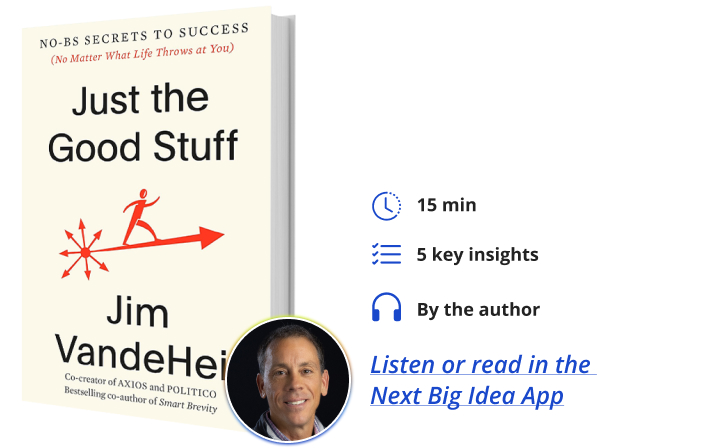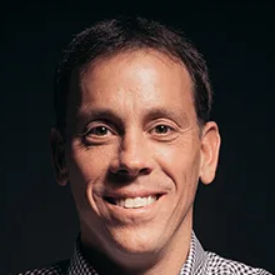Jim VandeHei is a political journalist turned entrepreneur. He is the co-founder, former CEO, and executive editor of Politico, as well as co-founder and current CEO of Axios. Previously, he was the White House reporter for the Washington Post and the Wall Street Journal.
Below, Jim shares five key insights from his new book, Just the Good Stuff: No-BS Secrets to Success (No Matter What Life Throws at You). Listen to the audio version—read by Jim himself—in the Next Big Idea App.

1. Zotheka—anything really is possible.
Zotheka is a word I learned in Malawi while on a mission trip with my two sons. It means it’s possible. The word moved me so much that I stamped the first tattoo of my life on my shoulder when I returned because I was so inspired by this sense of purpose that the people there had despite a pretty bad situation around them.
I start the book with zotheka because that really is my story. Had you met me at age 20, there was nothing about me that said, Hey, this guy is going to go on to cover the White House, interview presidents, start companies, make a lot of money, sell companies, and be a CEO two times over. There was nothing remarkable about my grades, my performance, or my extracurricular activities. It doesn’t matter if you grew up in Oshkosh, WI, (like me) or you come from great privilege. Anything is possible for everyone.
It’s the beautiful thing about America, but I think there are a lot of people who come from small towns or have minimal privilege or money or connections who have a real chip on their shoulders. When I moved out to DC, I had that. I always assumed everyone was going to be smarter than me, more connected, and just better at their job than me. I quickly learned that if I applied what I learned in Wisconsin about hard work, honesty, and grit, those can carry a person a long way, especially if you tether it to something you’re passionate about. Anything really is possible if you just find something that you would maybe do for free—something you enjoy that much—that you can throw yourself into.
2. Aspire to be a selfless superstar.
I’ve had the privilege of working with thousands of people. I’ve hired thousands. I’ve had to let go of a lot of people. I’ve really learned a lot about what works and what doesn’t, and the type of person that I aspire to be or that I just want to be around (what we used to call killers with humility, but people thought that was too aggressive) are selfless superstars. You want to be around people who are very smart, motivated, and hardworking but who are also good people who put the company or the team above their own ambition.
“I think for a lot of us, you do have other options that would make sure you gravitate towards selfless superstars.”
Life is just too short to spend with narcissistic or self-absorbed people who are only motivated by what benefits them. Those are the people who cut corners and do bad things. So, if you find yourself in a place where you’re working with folks like that…just get the hell out. There’s no upside to it. If you work for a boss like that, try to move on. It’s such a bad, bad way to live life, and it’s so deflating. I think for a lot of us, you do have other options that would make sure you gravitate towards selfless superstars—like the selfless superstar you strive to be.
3. Be a boss with the might of soft power.
I knew nothing about leadership when I became a leader. I went straight from being a White House reporter at the Washington Post to helping start Politico. Back then I had one gear: drive it, drive it, drive it. In the early years of my career, hard power worked. A lot of people had this throwback attitude about the job, and it was male-dominated leadership with hard-charging, big drinking, and tough-talking. What I realized is that that hard power is vastly overrated.
If you’re good at what you do and a good leader, the real power comes from soft power. Such leaders wield a high level of emotional intelligence and a little bit of empathy and can just sit back and read the room instead of only sitting in their own heads. They ask questions like, what motivates people, what hurts people, and what gets people to do things they don’t even know they’re capable of? If you can master soft power, you’ll have far more power than you would ever have through hard power. And I think that EQ, like IQ, is something you can train over time.
I look back, and I realize how much I benefited from playing a lot of poker and being a bartender back in Wisconsin. Both those activities force you to interact with many different kinds of people, force you to read all those people, and teach finesse and nuance, which are essential ingredients to soft power.
4. Give yourself and others the gift of candor.
Candor is a hallmark of the culture at Axios. Candor doesn’t mean license to be a jerk and just say whatever is on your mind. Candor is about being brutally honest with yourself about your strengths, weaknesses, and individual situations and giving people the gift of candor during their difficult situations. I remember sitting at the Washington Post, and I knew some reporters were unliked and produced unimpressive work, but no one ever told such a reporter what they were actually doing wrong. These are the reporters who might get moved to a more remote bureau or placed on a less desirable beat. I always hated that because if I was that person, I wish someone would say, Hey, you’re not that great of a reporter. I really wish you could write better. That person deserves the option to become better at what they do.
“If you’re going to fire someone or force someone out, by the time it happens, it should never be a surprise.”
Early in my leadership at Politico, I learned that there is real power in candor—of just sitting down with people and being honest with them about the things they do well and the things they don’t do well. The more you do it, the better you get at it, and you can do it in a very respectful way. Especially once you’re in a position of power, if you’re going to fire someone or force someone out, by the time it happens, it should never be a surprise. You should have been in constant conversation with that person, being very clear and very vivid about the things that they weren’t doing that they need to correct if they want to stick around. If anyone’s surprised by the time they are let go, 95 percent of the time, that’s on the boss because it means leadership was ducking the hard stuff.
No one likes difficult conversations. I don’t love difficult conversations, but it’s a gift you can give other people. In a culture of candor, you create a culture of honesty, which cuts down on mischief and all the ickiness of work relationships.
5. Build your happiness matrix.
I don’t think you can separate personal life from work. People talk about work-life balance. I don’t really know what that is. I love what I do, so it’s kind of blended into everything that I do. I love politics, I love media, I love running businesses, so even my social conversations tend to revolve around that.
But one of the things I’ve done and learned to do is create a happiness matrix. Basically, a happiness matrix is composed of the things you need to pay attention to in order to stay happy in all the roles in your life (boss, husband, person, etc.). For me, the buckets I need filled tend to be my faith, my health, my marriage, my relationship with my children, my relationship with my immediate family and closest friends, and my hobbies. I try to do an inventory of those buckets regularly because if something’s off or if I’m grumpy, or I’m just not performing optimally, it’s usually because one of those buckets is low.
I am surprised so many people treat life like they’re a bobber in the water, just floating along with the current. We have control over so much: what we read, what we eat, how we treat others, how we think about our mental health, our physical health, and our emotional health. All those things make us us. If we intentionally control what we can, this helps us perform more optimally at work, but more importantly, more optimally at life. This is how each person gets more out of their turn on this earth.
To listen to the audio version read by author Jim VandeHei, download the Next Big Idea App today:
































